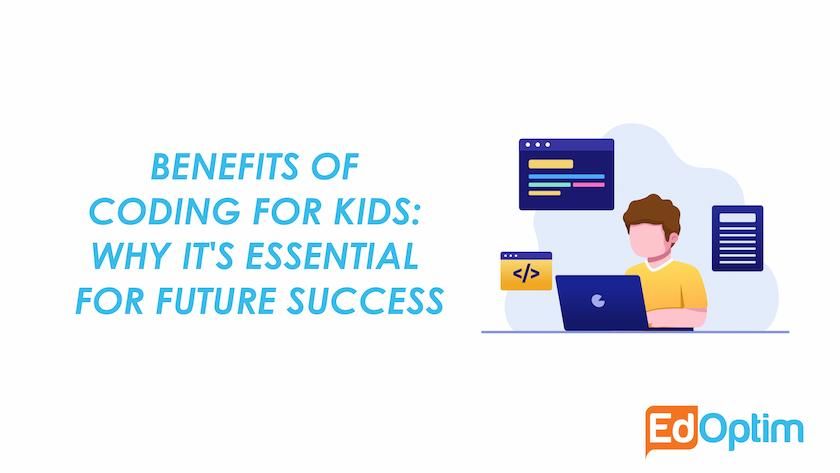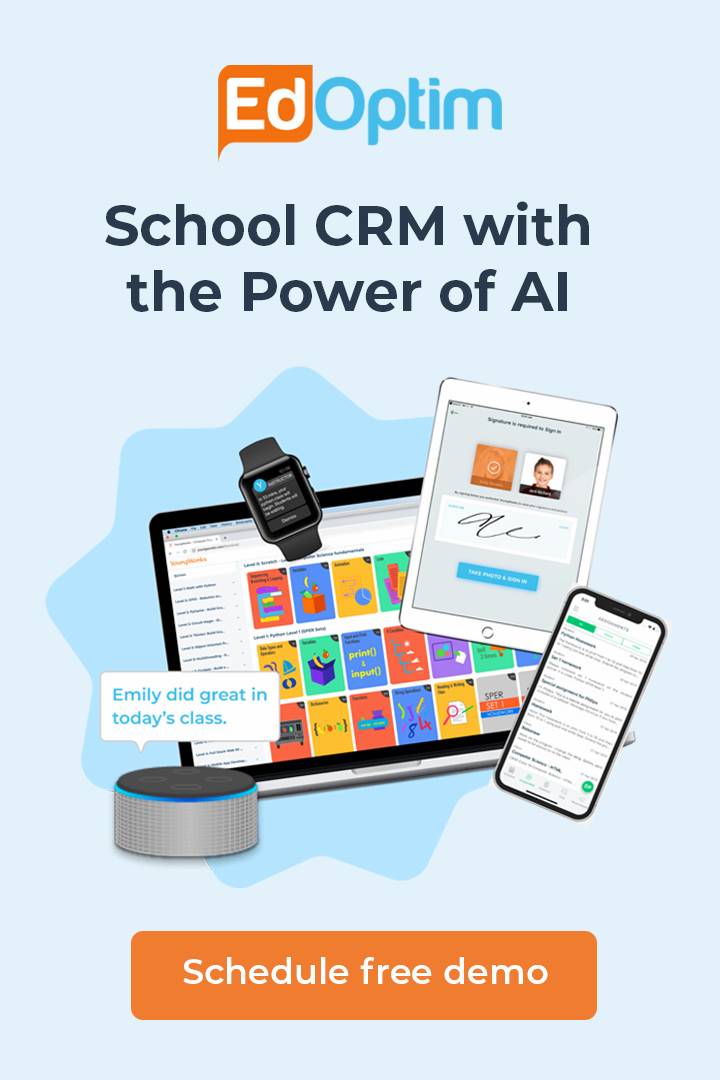Sep 30, 2024 By Team EdOptim *
What Are the Benefits of Learning Coding for Children?
Enhances Problem-Solving Skills: Coding is a practical way to teach problem-solving. Children learn to break down a complex problem into smaller tasks and then work through each one systematically. This approach fosters critical thinking and logic, essential skills for navigating both the coding world and the real world.
Boosts Creativity: Coding encourages creativity as children are required to think outside the box. Whether they’re developing their own video games or designing apps, they’re constantly challenged to create innovative solutions. At YoungWonks, students get hands-on experience with creative coding projects, such as animations and simple games, helping them explore their creative side.
Hands-on Learning Through Projects: Coding projects—like creating animations, apps, and games—provide children with hands-on learning experiences. By working on projects at a young age, students develop an understanding of the development process, from concept to execution.
Teaches Real-World Skills: Coding is a real-world skill that is applicable across industries. Learning coding at a young age ensures that children are prepared for future career opportunities. Coding also enhances their logical and computational thinking, skills that they can apply in other areas of their lives, such as robotics or STEM fields.
How Does Coding Help Students in the Future?
Future Career Opportunities: Coding opens the door to many career opportunities. Fields like software development, web development, game design, and artificial intelligence rely heavily on coding. At YoungWonks, children learn Python programming, which is a widely-used programming language in various fields, giving them a head start in careers like app development, game development, and even data science.
Prepares for the Job Market: The future job market is expected to be tech-heavy, with a growing demand for coding skills. Learning to code at a young age helps children become competitive in fields like web development, software engineering, and artificial intelligence.
Soft Skills and Teamwork: Coding also helps in the development of soft skills like collaboration, communication, and teamwork. Coding projects often involve working with peers, and students learn how to communicate ideas effectively while working in teams.
Fosters Critical Thinking: Critical thinking is developed through coding as it requires students to make logical decisions and troubleshoot issues. Students who start coding early, like those at YoungWonks, have the added advantage of mastering these critical thinking skills at a young age.
Why Is Coding an Essential Skill for the Future Generation?
The Digital World: We live in a digital world where coding is as important as traditional literacy skills like reading and writing. Coding is increasingly used in industries ranging from healthcare to finance. YoungWonks equips students with the necessary coding skills to navigate this fast-paced digital world, preparing them for success in a wide variety of future careers.
Artificial Intelligence and Robotics: The fields of artificial intelligence and robotics are growing rapidly, and coding is at the core of these technologies. By learning coding at a young age, students are positioning themselves for future careers in these emerging fields.
Logical Thinking and Problem-Solving: Logical thinking is one of the most important skills gained from coding. Through coding classes, children develop a way of thinking that is methodical, solution-oriented, and precise, which can be applied across various areas of life.
Computational Thinking: Computational thinking allows students to approach complex problems methodically. Whether they are building an app or a game, this thought process is essential. At YoungWonks, students learn to apply computational thinking to real-world problems, setting them up for future success in technology-related fields.
What Are the Most Effective Educational Software Tools for Teaching Coding to Kids?
YoungWonks’ Python Program: At YoungWonks, students are introduced to Python, one of the most popular and versatile programming languages in the world. Through Python, students learn the fundamentals of coding while working on real-world projects like games, websites, and apps.
Scratch: Scratch is a visual programming language designed for younger children. It allows them to create stories, games, and animations by dragging and dropping blocks of code, making it an excellent way to introduce coding concepts in a fun and interactive way.
Minecraft and Roblox: These platforms allow children to explore coding by creating mods and games within an existing game environment. Both Minecraft and Roblox teach coding concepts in a game-like, enjoyable atmosphere, encouraging creativity and logical thinking.
Other Tools: Platforms such as Code.org, Tynker, and Blockly are also effective tools for introducing coding to kids, providing tutorials, exercises, and challenges to enhance their skills.
How to Learn Coding?
Start with Python: Python is an excellent programming language for beginners due to its readability and simplicity. YoungWonks specializes in teaching Python to children, helping them develop a strong coding foundation early on. Python is used in various fields, including data science, web development, and artificial intelligence, making it a valuable skill.
Learn Through Games and Projects: Kids learn best by doing, which is why many coding schools, including YoungWonks, incorporate project-based learning. Whether it’s building a game or an app, projects give kids the chance to apply their coding knowledge and see their ideas come to life.
Take Online Tutorials: For students who prefer to learn at their own pace, online tutorials can be a great supplement to classroom learning. There are numerous resources, such as Codecademy or Khan Academy, where kids can practice coding in different programming languages.
When Will I Be Able to Use These New Coding Skills to Complete a Finished Project?
YoungWonks Approach: At YoungWonks, students are encouraged to work on real-world projects from the start. By focusing on practical applications of their coding skills, they quickly see results in the form of completed projects like games, apps, or websites.
Iterate and Improve: The development process is all about iteration. Students can build their first project and then refine it, adding new features or improving the user experience based on feedback. This process teaches valuable problem-solving and troubleshooting skills.
What Are the Best Programming Languages for Kids to Learn?
Python: Python is an excellent starting point for kids because of its simplicity and versatility. It’s used in web development, data science, artificial intelligence, and more. At YoungWonks, Python is the primary language taught, providing a strong foundation for future learning.
JavaScript: JavaScript is another essential language for web development. Learning JavaScript allows students to build interactive websites, which is a valuable skill in today’s job market.
Scratch: For younger kids, Scratch is a great introduction to programming. It helps them understand coding logic in a visual, block-based environment, making it ideal for beginners.
How Important Will Coding Be in the Future?
Coding Will Be a Must-Have Skill: In today’s world, coding is no longer just for computer scientists. It’s becoming an essential skill in many industries. Learning to code at an early age provides children with the tools they need to succeed in the job market of the future, whether they want to become programmers, engineers, or entrepreneurs.
Career Opportunities Abound: Whether it’s app development, artificial intelligence, or robotics, coding opens doors to a wide range of career opportunities. YoungWonks is dedicated to ensuring students are prepared to take on the challenges of tomorrow’s job market by teaching them the coding skills they need to thrive.
Digital Literacy: Coding is a part of digital literacy, which is becoming as important as reading and writing. It gives children the ability to understand and shape the digital world around them, preparing them for success in both their personal and professional lives.
Conclusion
In today’s world, computer science has become a cornerstone of modern education, providing kids with essential skills that are critical for success in the 21st century. As young coders dive into coding languages and computer programming, they not only learn to build exciting coding games but also enhance their technical skills and communication abilities. Kids coding programs, like those offered at YoungWonks, teach valuable algorithms and data analysis techniques, which are increasingly relevant in today’s data-driven environment. Through a well-rounded coding education, children are better prepared for the challenges of the digital age, gaining both problem-solving and communication skills that are necessary in English-speaking and global contexts.
Coding is an essential skill for the next generation, offering numerous benefits such as enhanced problem-solving skills, creativity, and future career opportunities. At YoungWonks, children are introduced to coding through Python programming and go on to build websites, apps, games, and more. By teaching coding at a young age, we are preparing kids to excel in the digital world of tomorrow. Whether they’re building games, developing apps, or solving real-world problems, the coding skills they gain now will set them on the path to future success.
*Contributors: Written by Prasanna MG; Edited by Alisha Ahmed; Lead image by Shivendra Singh

